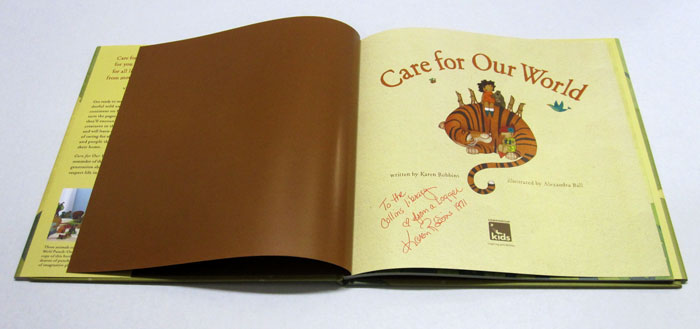2011: Care For Our World & The Googlization of Everything (and Why We Should Worry)
Care For Our World
Author/Editor: Karen Robbins
Find it in Collins Library!

The author is a Puget Sound graduate. This children’s book shares the story of how we must all take responsibility for taking care of our home: “This world is our home. We need one another. Please care for our world; we’re sisters and brothers.” The illustrator, Alexandra Ball, is based in the UK and her whimsical illustrations depicting flowers, insects, animals and children reinforce Karen’s text. Karen’s blog provides insight into this Logger’s life — from incredible travel stories to accounts of scuba diving and motivational speaking.
Care For Our World just won another award! CARE received the Silver Moonbeam medal in the category of a children’s book with merchandising category giving the book five awards so far!


The Googlization of Everything (and Why We Should Worry)
Author/Editor: Siva Vaidhyanathan
Find it in Collins Library!

The Googlization of Everything seemed like a good choice to represent 2011, since Google is now nearly synonymous with any kind of search and many other kinds of internet service. When I open my browser, Google is a default search box in the upper right hand corner, and it’s a first place to turn for general information and initial searching. When I open my personal email, Google is serving it to me. When I browse the web, Google is often supplying me with ads targeted to my interest.
So it therefore seems fitting that we examine what has become a default on the Web, “the lens through which we view the world” (Vaidhyanathan, xi). What is Google doing? How is that influencing my interactions with people and information. Siva Vaidhyanathan provides a few answers and more questions in The Googlization of Everything (and Why We Should Worry).
Vaidhyanathan examines what Google means in terms of privacy, public interactions and norms, books, and filtered knowledge. While Vaidhyanathan has many thoughts about the specifics of Google, in the end, much boils down to not confusing information with wisdom, and not trusting human creations of any kind blindly. Google may seem omnipotent and be full of good intentions—but good intentions are not the same as good outcomes. Applying a skeptical eye to Google will help us use its tools well, and avoid problematic outcomes.










